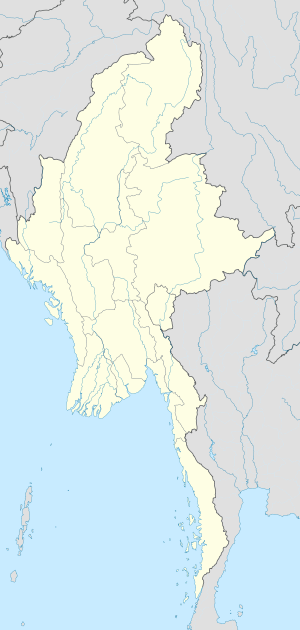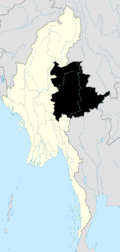Pinlaung
Pinlaung is a town 1,510 meters above sea level[1] and seat of Pinlaung Township, in the Pa-O Self-Administered Zone of Shan State of eastern-central Burma. It lies along National Road 54, north-west by road from Loikaw. Running through the city center is a rail line connecting Loikaw to Kalaw, two major tourist towns in the area.[2][3]
Pinlaung | |
|---|---|
Town | |
Aerial View of Pinlaung | |
 Pinlaung Location in Burma | |
| Coordinates: 20°5′42″N 96°47′23″E | |
| Country | |
| State | |
| District | Pa-O Self-Administered Zone |
| Township | Pinlaung Township |
| Elevation | 1,510 m (5,000 ft) |
| Time zone | UTC+6.30 (MST) |
Tourism
Tourists who visit the town of Pinlaung may visit Mway Daw Pagoda, the Nam Hoo Kyaung Tike Temple, and an authentic traditional craft market. Twenty minutes from the city center is another popular destination with tourists, Loi Maung Taung Pagoda. This stupa sits at the highest peak in the region, Loi Maung Taung. Another, lesser-known, mountain outside of the city center is Wingabar Mountain. This historic mountain is located 3.5 miles (5.7 kilometers) from Pinlaung in the village of Taung Hti Bwar and features a full-length cave, called Yar Za Cave or Hti Bwar Cave.[5]
Economics

Traditionally, farmers from the Pinlaung area grew subsistence crops such as cheroot leaves, maize, and beans. When the opium trade took off in the 1900s, poppy was featured as a major cash crop in the area. However, in recent years, there have been efforts to focus on other saleable crops such as coffee and tea.[6] Now, Pinlaung is the premier tea-growing town in Myanmar, with the Assam tea being the most predominant cultivar grown.[7] Furthermore, cabbage, cauliflower, potato, corn, and sesame grow in abundance due to the favorable climate conditions.
Before 2010, accessing Pinlaung was a difficult task. Merchants from Naypyidaw,southern, and western Myanmar who wanted trade with the highland farmers and ethnic tribes in Pinlaung were required to traverse the dangerous winding roads of Elephant Mountain (Sin Taung) and cross the Paung Laung River by boat.[8] Then, Myanmar's former government contracted P.T.Waagner-Biro Indonesia together with Supreme Group of Companies to construct an expansive steel truss suspension bridge to span the river. The bridge, known as the Leinli Bridge, would become the highest of its kind in Myanmar. The bridge was opened on November 5, 2010, at a cost of 3.476 million in foreign currency and an additional 14,500 million kyats.[9]
Climate
Pinlaung has a subtropical highland climate (Cwb).
| Climate data for Pakokku (1981–2010, extremes 2001–2010) | |||||||||||||
|---|---|---|---|---|---|---|---|---|---|---|---|---|---|
| Month | Jan | Feb | Mar | Apr | May | Jun | Jul | Aug | Sep | Oct | Nov | Dec | Year |
| Record high °C (°F) | 28.3 (82.9) |
28.2 (82.8) |
31.4 (88.5) |
33.0 (91.4) |
33.4 (92.1) |
29.6 (85.3) |
28.4 (83.1) |
29.4 (84.9) |
28.6 (83.5) |
29.4 (84.9) |
28.6 (83.5) |
26.8 (80.2) |
33.4 (92.1) |
| Average high °C (°F) | 22.7 (72.9) |
24.1 (75.4) |
26.5 (79.7) |
28.2 (82.8) |
25.9 (78.6) |
24.5 (76.1) |
22.3 (72.1) |
22.8 (73.0) |
24.3 (75.7) |
24.8 (76.6) |
23.7 (74.7) |
22.6 (72.7) |
24.4 (75.9) |
| Daily mean °C (°F) | 13.4 (56.1) |
15.1 (59.2) |
18.0 (64.4) |
21.0 (69.8) |
21.3 (70.3) |
20.9 (69.6) |
19.7 (67.5) |
20.0 (68.0) |
20.5 (68.9) |
19.8 (67.6) |
17.4 (63.3) |
14.3 (57.7) |
18.5 (65.2) |
| Average low °C (°F) | 4.1 (39.4) |
6.1 (43.0) |
9.5 (49.1) |
13.9 (57.0) |
16.7 (62.1) |
17.4 (63.3) |
17.2 (63.0) |
17.3 (63.1) |
16.8 (62.2) |
14.9 (58.8) |
11.1 (52.0) |
6.0 (42.8) |
12.6 (54.7) |
| Record low °C (°F) | −2.0 (28.4) |
0.1 (32.2) |
3.5 (38.3) |
9.0 (48.2) |
9.6 (49.3) |
12.6 (54.7) |
14.8 (58.6) |
15.0 (59.0) |
12.0 (53.6) |
10.2 (50.4) |
1.3 (34.3) |
−1.3 (29.7) |
−2.0 (28.4) |
| Average rainfall mm (inches) | 2.7 (0.11) |
5.9 (0.23) |
9.6 (0.38) |
57.1 (2.25) |
171.9 (6.77) |
178.3 (7.02) |
213.0 (8.39) |
290.9 (11.45) |
280.7 (11.05) |
175.6 (6.91) |
75.5 (2.97) |
10.0 (0.39) |
1,471.2 (57.92) |
| Source: Norwegian Meteorological Institute[10] | |||||||||||||
References
- "Pinlaung". Retrieved 15 November 2018.
- Google Maps (Map). Google.
- Bing Maps (Map). Microsoft and Harris Corporation Earthstar Geographics LLC.
- "Discover Myanmar, Beauty Begins in Shan State". Retrieved 14 March 2019.
- "Discover Myanmar, Beauty Begins in Shan State". Retrieved 14 March 2019.
- "Discover Myanmar, Beauty Begins in Shan State". Retrieved 14 March 2019.
- "Change Afoot in Southern Shan". Retrieved 15 November 2018.
- "Discover Myanmar, Beauty Begins in Shan State". Retrieved 14 March 2019.
- "Leinli Bridge, Supreme Group of Companies" (PDF). Retrieved 14 March 2019.
- "Myanmar Climate Report" (PDF). Norwegian Meteorological Institute. pp. 23–36. Archived from the original (PDF) on 8 October 2018. Retrieved 1 December 2018.

